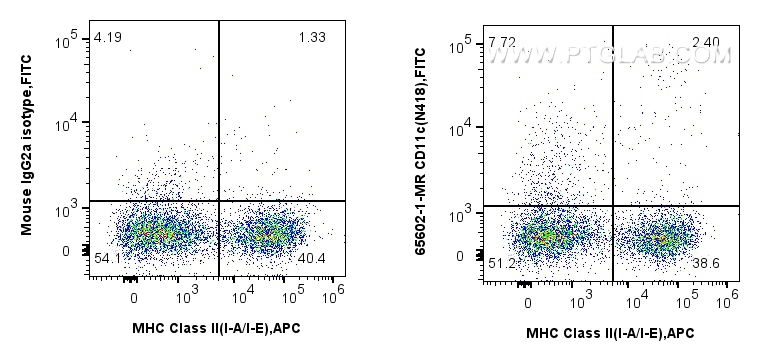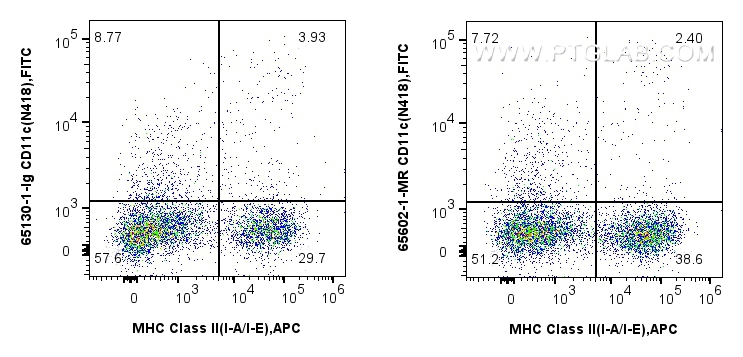验证数据展示
经过测试的应用
| Positive FC detected in | mouse splenocytes |
推荐稀释比
| Application | Dilution |
|---|---|
| This reagent has been tested for flow cytometric analysis. It is recommended that this reagent should be titrated in each testing system to obtain optimal results. | |
| Sample-dependent, Check data in validation data gallery. | |
产品信息
65602-1-MR targets CD11c in FC applications and shows reactivity with Mouse samples.
| Tested Applications | FC Application Description |
| Tested Reactivity | Mouse |
| Immunogen | Mouse spleen dendritic cells 种属同源性预测 |
| Host / Isotype | Mouse / IgG2a |
| Class | Recombinant |
| Type | Antibody |
| Full Name | integrin alpha X |
| Synonyms | AI449405, Cd11c, Cr4, integrin alpha X, Itgax |
| GenBank Accession Number | BC167225 |
| Gene Symbol | CD11c |
| Gene ID (NCBI) | 16411 |
| RRID | AB_3670349 |
| Conjugate | Unconjugated |
| Form | Liquid |
| Purification Method | Protein A purification |
| Storage Buffer | PBS with 0.09% sodium azide. |
| Storage Conditions | Store at 2-8°C. Stable for one year after shipment. |
背景介绍
Integrins are cell adhesion receptors that are heterodimers composed of non-covalently associated α and β subunits (PMID: 9779984). CD11c, also known as integrin αX, is a type I transmembrane glycoprotein present on a variety of cells, including monocytes/macrophages, granulocytes, a subset of B cells, NK cells and dendritic cells (PMID: 2897326; 1680915; 1694698; 17389580). As a result of its high level of expression on most dendritic cells, CD11c is typically considered to be a marker of conventional dendritic cells (PMID: 27119555). CD11c forms an α/β heterodimer with CD18 (integrin β2). CD11c/CD18 acts a receptor for fibrinogen and is important in monocyte adhesion and chemotaxis (PMID: 1671533).
实验方案
| Product Specific Protocols | |
|---|---|
| FC protocol for CD11c antibody 65602-1-MR | Download protocol |
| Standard Protocols | |
|---|---|
| Click here to view our Standard Protocols |

